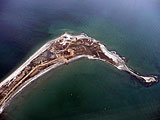Hydrocarbon Hotspot, Caspian Challenges
By Sergei Blagov for ISN
The Caspian region is arguably the site of the 21st century’s next oil and gas bonanza. But it has been slow to realize its potential as a global energy supplier due to continued disagreements between the littoral states over the Caspian Sea's division and other matters.
The leaders of the former Soviet states of Azerbaijan, Kazakhstan, Russia and Turkmenistan met in Kazakhstan's Caspian port of Aktau on 12 September for an informal summit intended to discuss Caspian cooperation. Indicative of the nature of Caspian disputes, the Iranians were not invited, sparking verbal protests in Tehran.
In Aktau, Azerbaijan and Turkmenistan apparently refrained from a public discussion of their latest security disagreements. In late August, Turkmenistan announced plans to build a naval base on its Caspian Sea coast, sparking criticism in Baku and prompting Azerbaijan's Foreign Ministry to urge the "demilitarization" of the Caspian Sea.
Turkmenistan's plans sparked concerns of a possible arms race in the Caspian. Officially, Turkmenistan used to have no naval forces. Unlike Turkmenistan, Azerbaijan owns naval facilities in Baku as well as one-quarter of the former Soviet Caspian flotilla.
Following the division of the Soviet Caspian Flotilla in 1992 between Moscow and Baku, Russia kept three-quarters of the naval vessels and personnel. The withdrawal of the flotilla from its former base in Baku forced Russia to build a new base in Astrakhan (in Russia, on the Volga River, which discharges into the Caspian Sea). Over the course of the past several years, Russia has more than doubled its Caspian naval force.
While Kazakhstan also has a modest naval force, Tehran was prohibited from having the same in the Caspian Sea by treaties between czarist Russia and Persia as well as the USSR and Iran. However, in the wake of the Soviet collapse, Iran has reportedly been mulling over the possibility of turning its Caspian ports into naval bases. However, similar intentions of Turkmenistan sparked uneasiness among some neighbors.
Security concerns have been reflected in political disagreements. Notably, a complete division of the whole Caspian Sea, advocated by Iran, would mean that Russian naval forces could not travel freely across the Caspian Sea. For its part, Russia advocates a "modified median line" for the division of the Caspian Sea-bed, leaving the surface waters for common use, including by naval forces.
Russia has been also aiming at excluding all non-littoral states from having a military presence in the Caspian Sea. In October 2007, all the littoral states agreed to keep third-party ships from entering the Caspian Sea.
Moscow also advocates the creation of a multinational force (CASFOR) in the Caspian Sea. However, CASFOR - as an alternative to unilateral naval build-up by the littoral states - has been slow to demonstrate its viability.
Russia and other littoral states have disagreed not only on the Caspian division, but also on the issue of sub-sea pipelines. Moscow has opposed the project for the US-backed under water pipeline across the Caspian Sea, which would bypass Russia by linking Central Asian gas fields directly to the West.
Azerbaijan and Kazakhstan advocate freedom of transit for all means of transportation in the Caspian, including pipelines. However, Russia insists that all major energy projects in the Caspian Sea be approved by a consensus among all littoral states.
That said, this month has seen at least some of the Caspian economic disagreements nearly resolved. In the immediate aftermath of the Aktau summit, Russia and Turkmenistan moved to restore their energy relationship. At a meeting on 13 September between Turkmen President Gurbanguly Berdimuhamedov and his visiting Russian counterpart Dmitry Medvedev, both sides agreed to resume Turkmen gas supplies to Russia. Bilateral gas trade was halted in April 2009, and Turkmenistan was forced to negotiate alternative gas export possibilities with Iran.
The Aktau summit was also expected to discuss the creation of the Caspian Economic Cooperation Organization (CECO), but no decisions on that was announced after the meeting. The CECO was due to hold its first meeting in Russia in 2008, but the meeting failed to materialize, apparently due to overlapping economic interests of the littoral states.
As such, the latest top-level exchanges between Caspian leaders have once again demonstrated the difficulties in reaching a broad regional consensus. For the foreseeable future, the situation looks set to maintain the status quo, to the detriment of sustainable consensus-based solutions for pressing security, political and economic problems in the strategic Caspian region.

